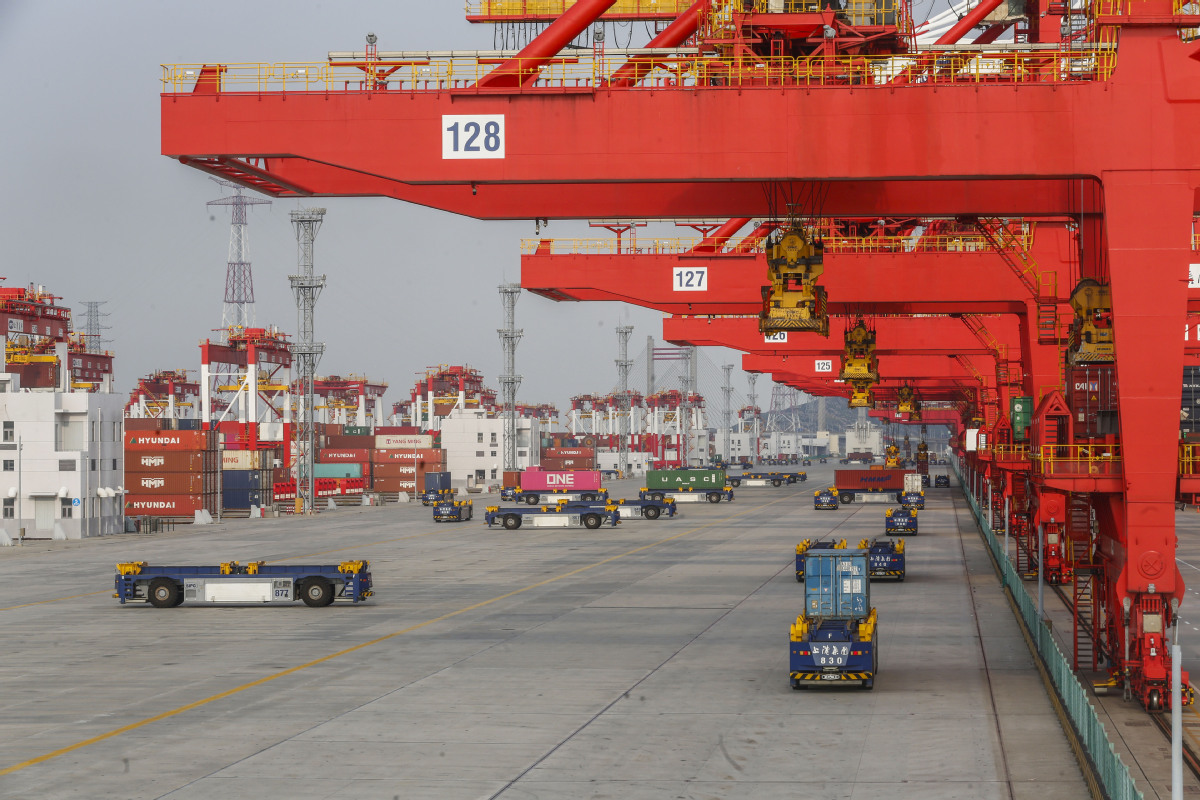Shanghai's Yangshan zone to better serve delta region
By CAO CHEN in Shanghai | China Daily | Updated: 2020-06-11 08:46

Area pushes forward nation's deeper and integrated economic opening-up
Editor's Note: With the integration of the Yangtze River Delta further intensifying since May 2019, China Daily looks into how this national strategy is injecting fresh development impetus and reform potential to the nation's major economic powerhouse.
Shanghai's Yangshan Special Comprehensive Bonded Zone, the first and only one of its kind nationwide, is exploring trade liberalization and effective supervisory policies for enterprises to improve their competitiveness in the international market and better serve integration of the Yangtze River Delta region.
Launched by the Shanghai government on May 16, the zone spans 25.31 square kilometers. It is located in the Lingang Special Area of the China (Shanghai) Pilot Free Trade Zone, and it pushes forward the national strategy of deeper and all-round high-level opening-up.
The zone consists of the Luchao port area, Xiaoyangshan island area and areas around Pudong International Airport.
Preferential policies are offered to enterprises in the zone in six categories including declaration modes, trade supervision, regional management, statistical systems, information management and collaborative management, said Song Penglin, deputy director in charge of the zone with the Management Committee of Lingang New Area.
Unnecessary trade supervision, permits and processes will no longer be necessary in the zone, with safety and efficiency given top priority.
"It means enterprises can take delivery of goods more efficiently, thus speeding up logistics processes for cross-border e-commerce companies," Song said.
The customs declaration system will be simplified to guarantee investment and trade utility.
Statistical methods used by Customs departments will also be upgraded, accelerating the development of international transfer services.
Enhanced convenience offered to enterprises in the zone is backed up by scientific and efficient management.
In 2019, an integrated information management services platform was launched, aiming to provide information support to enterprises to carry out innovative projects and keep up with changing market demand.
The real-time monitoring platform is connected to smart facilities as well as institutions and enterprises in the zone, said Yang Yong, deputy manager of Shanghai E&P International. The firm participated in the development of the platform.
"It also realizes smart supervision over enterprises and information sharing among authorities," Yang said.
How many trucks are working in the zone, where they are shipping goods from and whether they deliver goods to the right warehouses-such detailed information is shown on the platform, he added.
Song said the platform being explored in the zone will be upgraded and applied to the entire Lingang area in the future.
As the integration of the Yangtze River Delta proceeds, Song said the zone will be a hub linking Shanghai with other cities in the delta and around the world based on the development of the Yangshan Deep-Water Port in Shanghai-the largest automated cargo terminal in the world-Pudong International Airport and railway stations in the area.
Aside from traditional industries engaged in international trade and shipping, cutting-edge industries involved in artificial intelligence, biomedicine and integrated circuits are also what the zone focuses on, Song said.
"Resources in these industries are expected to be shared in the delta for further cooperation. We are exploring the collaboration of industrial parks in the delta," she added.
Zhang Xin, vice-president of Shanghai International Port Group, said Shanghai port has already cooperated with ports in neighboring Jiangsu, Anhui and Zhejiang provinces.
"The Yangtze River Delta integration will boost port resource allocation, data sharing and operational efficiency," Zhang said.
"Furthermore, it will promote port development in the delta, enhancing the global competitiveness of ports in China," he added.
Amid the COVID-19 pandemic, policies in the zone will be of great significance for enterprises to better cope with the possible adverse effects.
For example, financial support is provided by the Lingang Special Area to domestic companies serving in cargo transportation and warehousing industries in a bid to ensure stable trade flows and business growth.
Accordingly, Lingang Group requires its subsidiaries to formulate a slew of regulations, such as rent assistance.
"It will effectively relieve operational burdens on small and medium-sized enterprises amid the contagion," said Yang Manli, deputy director of the administrative office of the Shanghai Free Trade Zones United Development Company, a Lingang Group subsidiary responsible for the development and operation of the bonded zone.
























